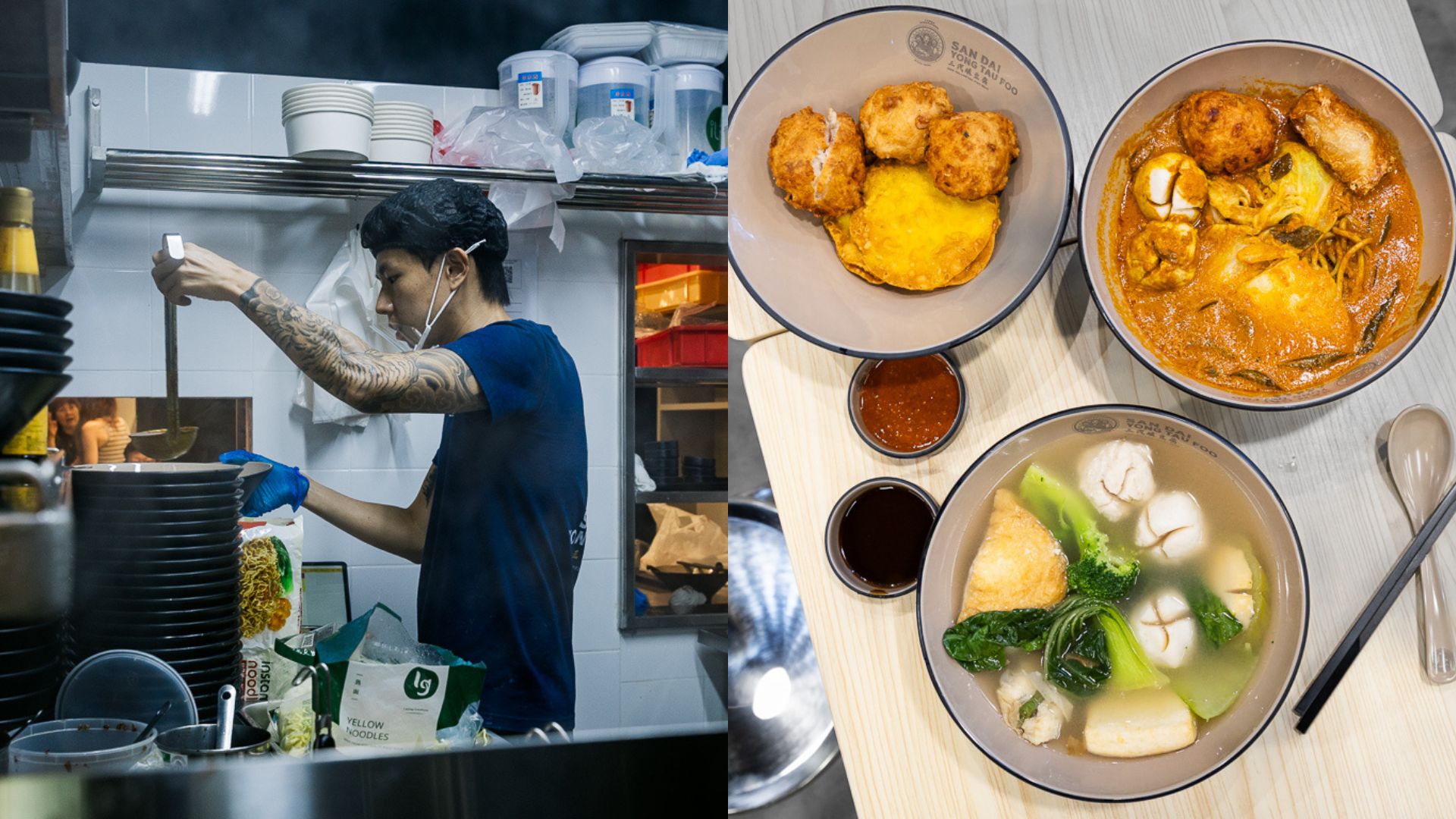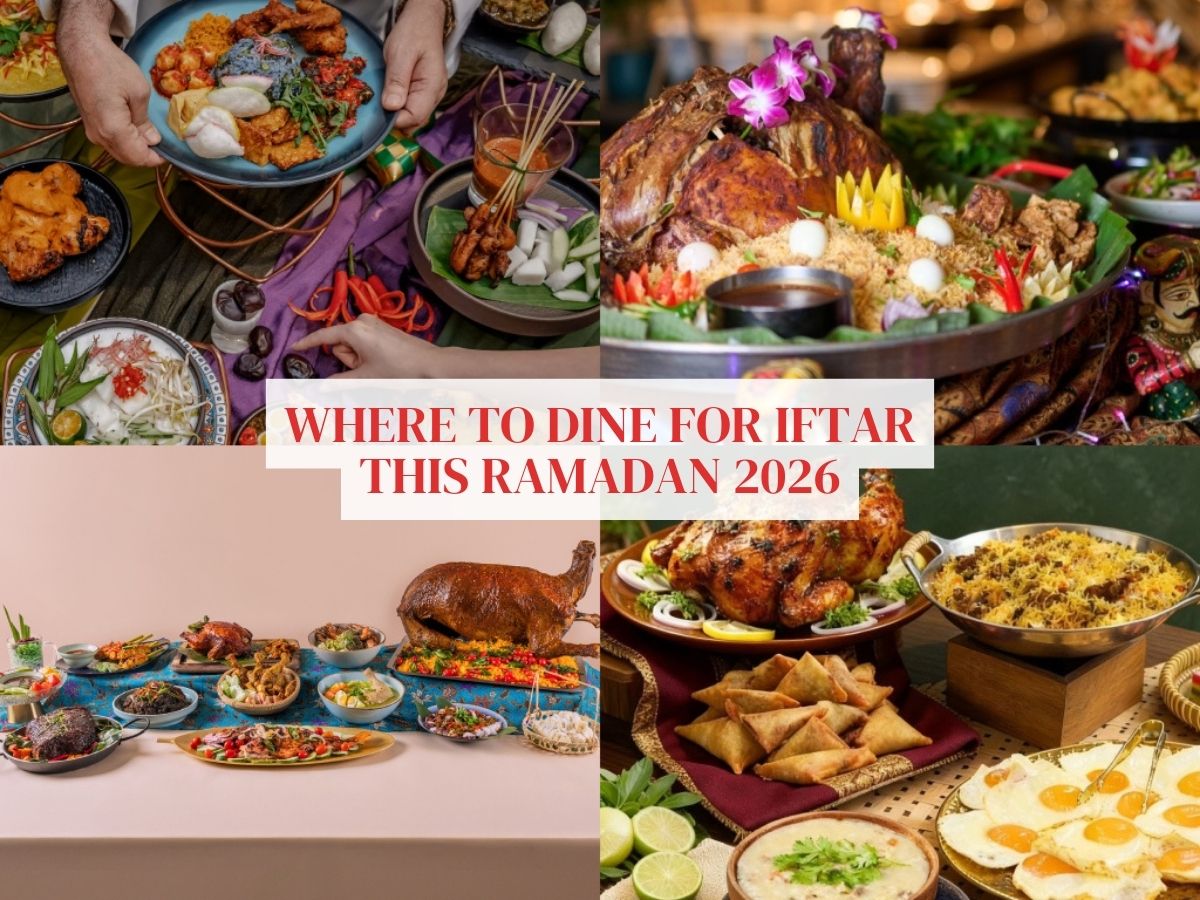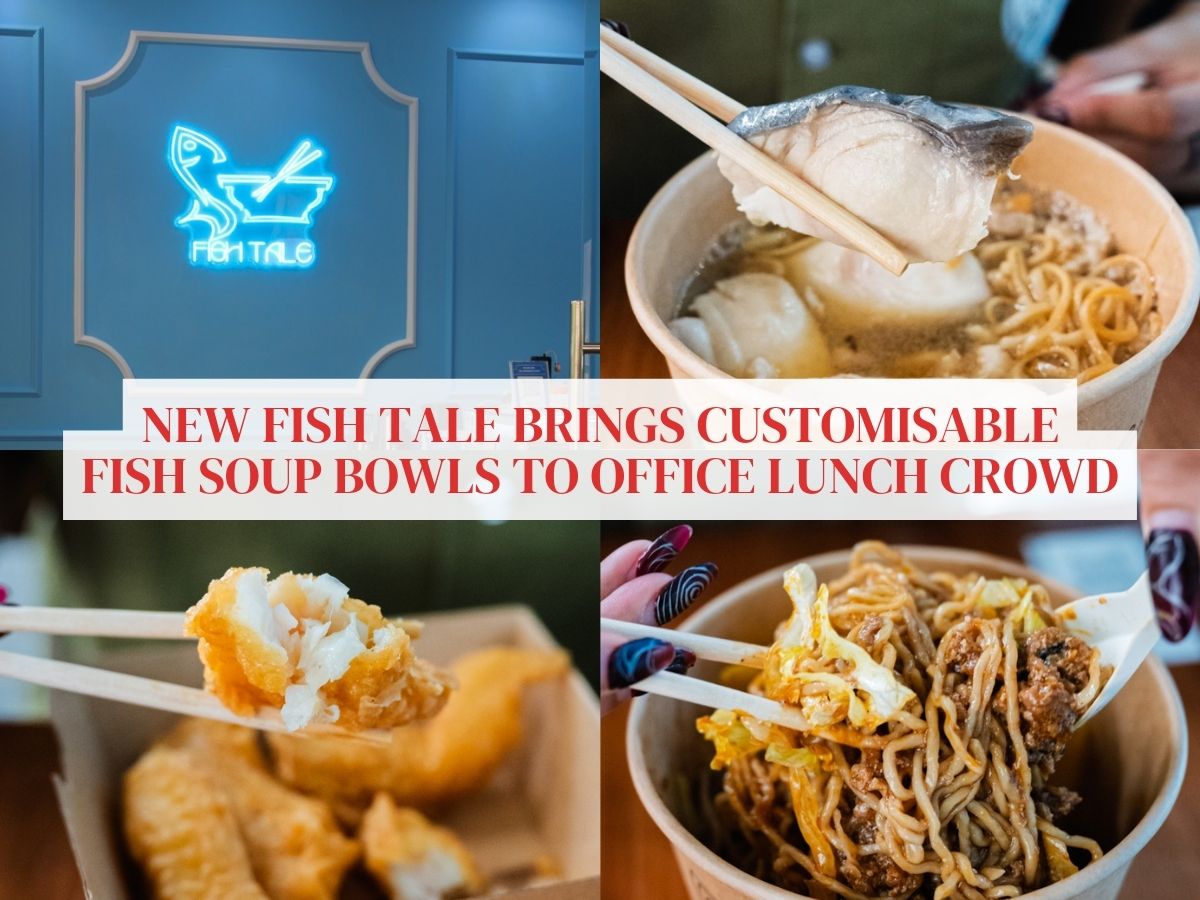SanDai Yong Tau Foo: New venture by SanDai’s young third-gen fishball maker Delonix Tan
- Founded by Delonix’s grandfather, SanDai Fishball is a wet market stall based in Toa Payoh that specialises in fresh, handcrafted yellowtail fishballs and yong tau foo that are free of preservatives.
- The family business recently opened a cooked food stall in Serangoon Garden, named SanDai Yong Tau Foo.
- We speak to Delonix, the third-generation fishball maker, about his personal mission to preserve his family’s legacy and keep this dying tradition alive.
Who would have thought that a hot-tempered, playful boy would one day grow into a disciplined young man with the weight of a family legacy on his shoulders?
At 27 years old, Delonix Tan is going above and beyond.
As the third-generation fishball maker at SanDai Fishball, this Gen-Zer is preparing to take the reins of a multi-generational heritage business, following the footsteps of his father and grandfather before him.
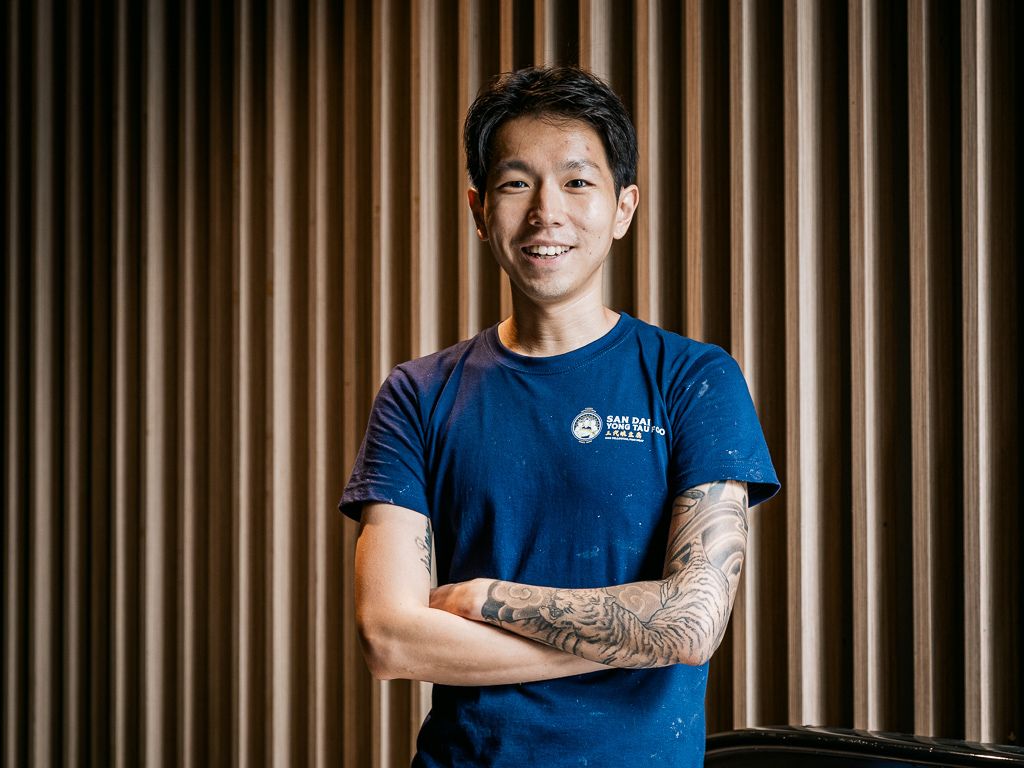
For some, Delonix might be a familiar face. He may have popped up on your social media feed, with honest glimpses into his life as a young hawker at his family’s fishball stall.
With close to 9,300 TikTok followers and over 136,000 likes to date, plus an Instagram community of over 24,000, his story has clearly struck a chord.
A handful of his videos have even gone viral, with some racking up more than a million views — proof that his heartfelt storytelling resonates far beyond the hawker centre.
But behind the digital spotlight lies a much older story — one that begins in the 1960s, when Delonix’s grandfather, Tan Kok Heng, manned a humble roadside cart selling handmade fishballs and yong tau foo.
Made from fresh yellowtail fish and entirely free of preservatives, the fishballs are crafted the old-fashioned, traditional way: The meat is first hand-minced, making it easier to be shaped into a springy paste. It’s then squeezed by hand and moulded with a spoon into round fishballs.
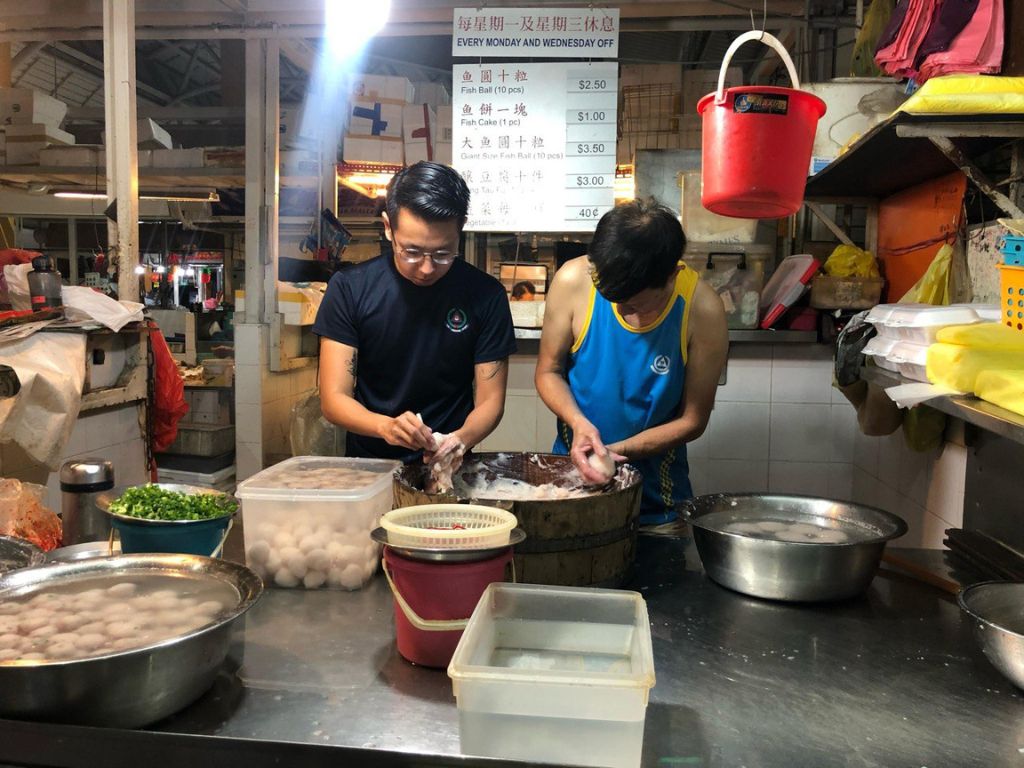
From those humble beginnings, the family business — formerly known as Heng Kee Fishball & Yong Tau Fu — eventually found a permanent home at Kim Keat Palm Hawker Centre at Toa Payoh Lorong 7.
Since then, it’s become a well-beloved fixture, especially among the older crowd and families who regularly buy SanDai’s raw products to stock their larders with.
Today, that legacy rests in the hands of Delonix’s father, Tan Yew Seng, 65, who still rises before dawn and commits to the labour-intensive technique of making fresh, handcrafted fishballs and yong tau foo, with the same workmanship that his own father taught him.
According to Delonix, it takes up to six hours for the family to prepare a day’s supply of fishballs.
Though Delonix hasn’t taken over the stall officially, the responsibility and pride he carries is apparent — he’s served as his father’s right-hand man for the past eight years, ever since his NS days.
For him, it’s a calling — a bridge between past and present, and a promise to keep the family’s work alive for generations to come.
A whole new era
In 2020, Delonix took a bold step to rebrand the stall to its current name — SanDai.
It carries a simple, yet powerful meaning that pays a tribute to the unwritten contract between his grandfather, his father, and himself.
The choice of name was also a way to connect with the younger generation.
“When you hear Heng Kee, it reminds you of some dialect — you may not understand what it means,” he explains. “So I wanted something straightforward: ‘SanDai’ means three generations of fishball making, so people would instantly know what we do.”
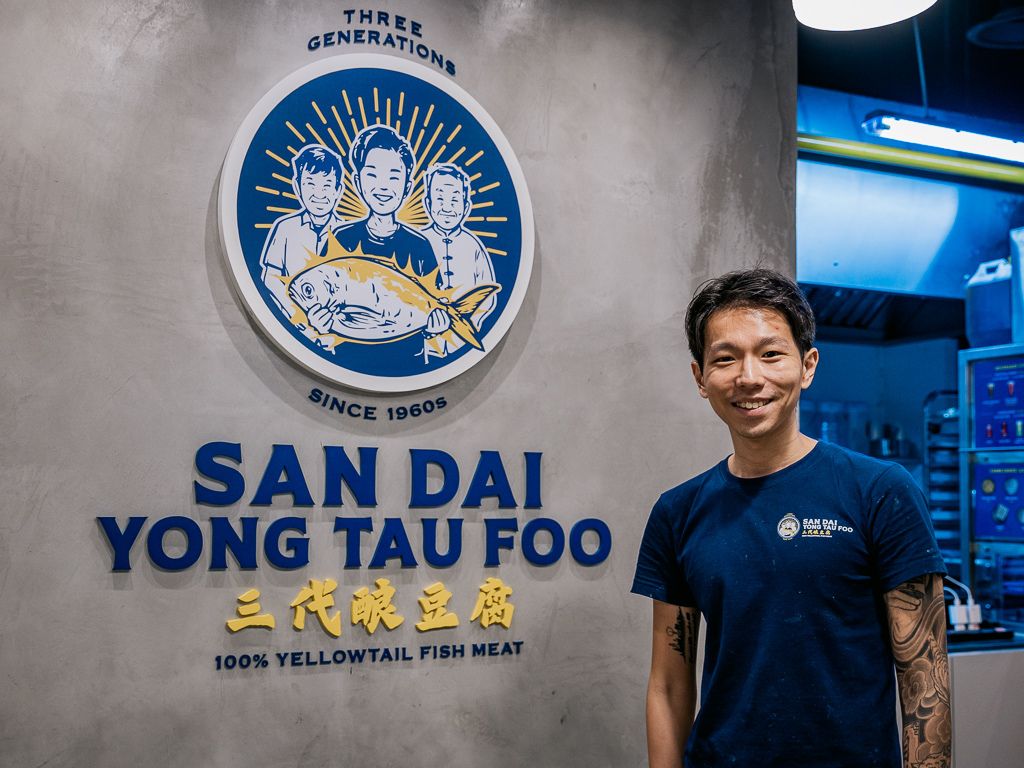
Despite the refreshed look, one thing remains constant: An unwavering promise to authenticity. Just as it has for generations, the Tan family upholds the very traditional process of making each fishball by hand, and each morning, too.
The family marked yet another milestone earlier this month.
Branching out from the family’s stronghold in Toa Payoh, Delonix opened a cooked food store at Serangoon Garden, where diners can savour the family’s yong tau foo and handmade fishballs in a more central location, piping hot, and on the spot, too!
From moments of struggle, to finding strength
As we sat down with Delonix, it was hard to miss the spark in his eyes — a fire that speaks to his enthusiasm and drive.
Thus far, it’s been a journey wrought with its fair share of storms, which include long days, little sleep, and the inevitable challenges of running a family business — and in the hawker trade, to boot!
His daily routine alone is unenviable.
“I sleep very early, around 8 to 9pm, then I’ll wake up around 12.40am to prepare for production. We’ll produce until 5 to 6am. Then, I’ll need to come down to my (yong tau foo) shop. I’ll sell until 2 to 3pm before I hand it over to my colleagues,” he recounts.
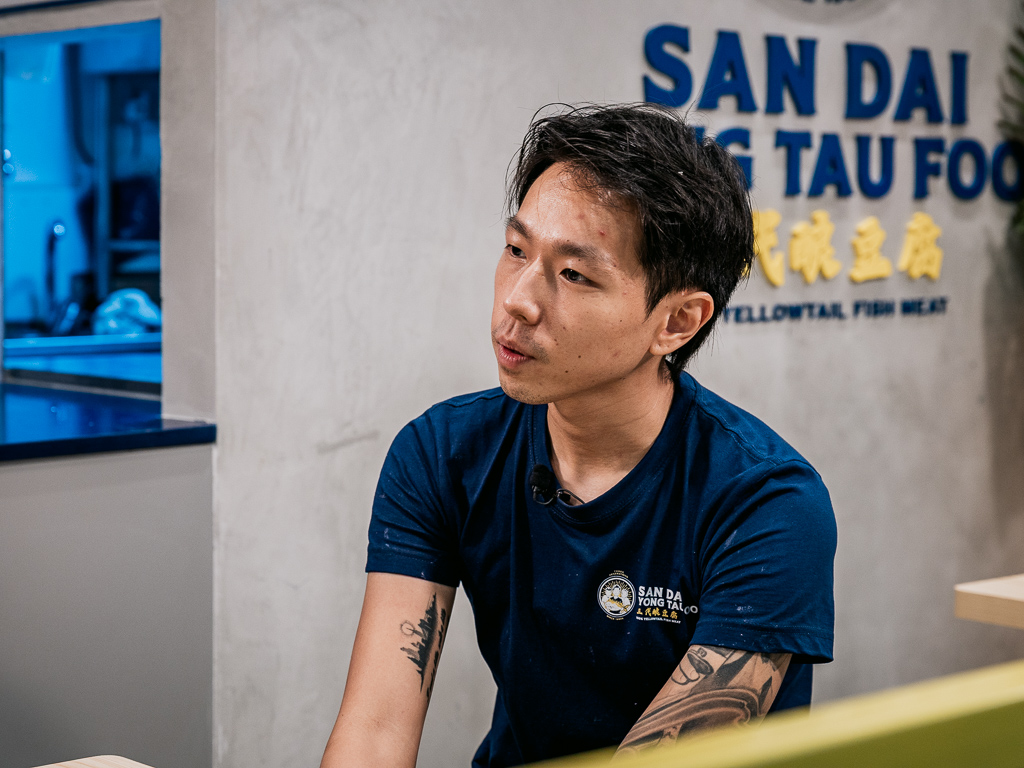
In Delonix’s book, it’s not about work-life balance, but rather, work-life integration.
“Sometimes you’ll have to bring work matters home, and conflicts may spill over,” he admits, candidly.
He characterises the early days of his hawker journey as choppy, often marked by clashes with his father.
“My dad is a craftsman, so he wants to control everything,” Delonix adds.
Like many Asian parents, his father’s tough love came as blunt words: “If you don’t know how to do it, then don’t waste time.” Delonix was forced to question whether joining the family business was truly worth it.
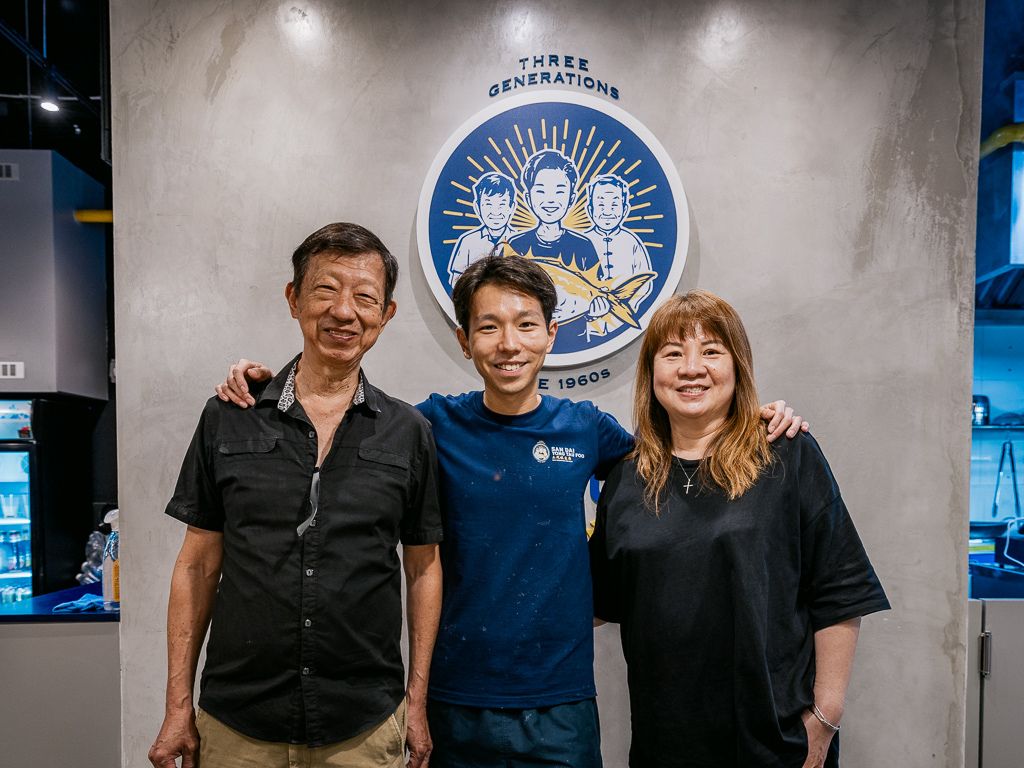
Navigating those moments wasn’t easy, especially for someone as strong-headed as Delonix once was.
But with time, patience, and better communication with his parents, these rough edges have softened — a sign of growth, not just in business, but in family ties and emotional maturity, too.
Delonix is quick to see the silver lining.
“The business has really helped to build my character. I used to live the opposite lifestyle — I would sleep late, drink, and I was very undisciplined,” he recalls.
Most importantly, he reflects: “It has strengthened our family bond because we have a common goal to bring the family business forward.”
Somehow became a personal calling
Though his parents discouraged him from joining the family business — wary of its grueling hours and unrelenting demands — Delonix has since found himself deeply rooted in the craft.
After years of waking when most of us would be settling down to sleep, he now finds making fishballs and yong tau foo a second nature — part of his muscle memory.
“I didn’t even know if I could persevere in the long run,” he says. “But when I started doing it for a long period of time, it eventually became a part of my identity. Now I’ve gotten so good at it that I feel like it’s my passion.”
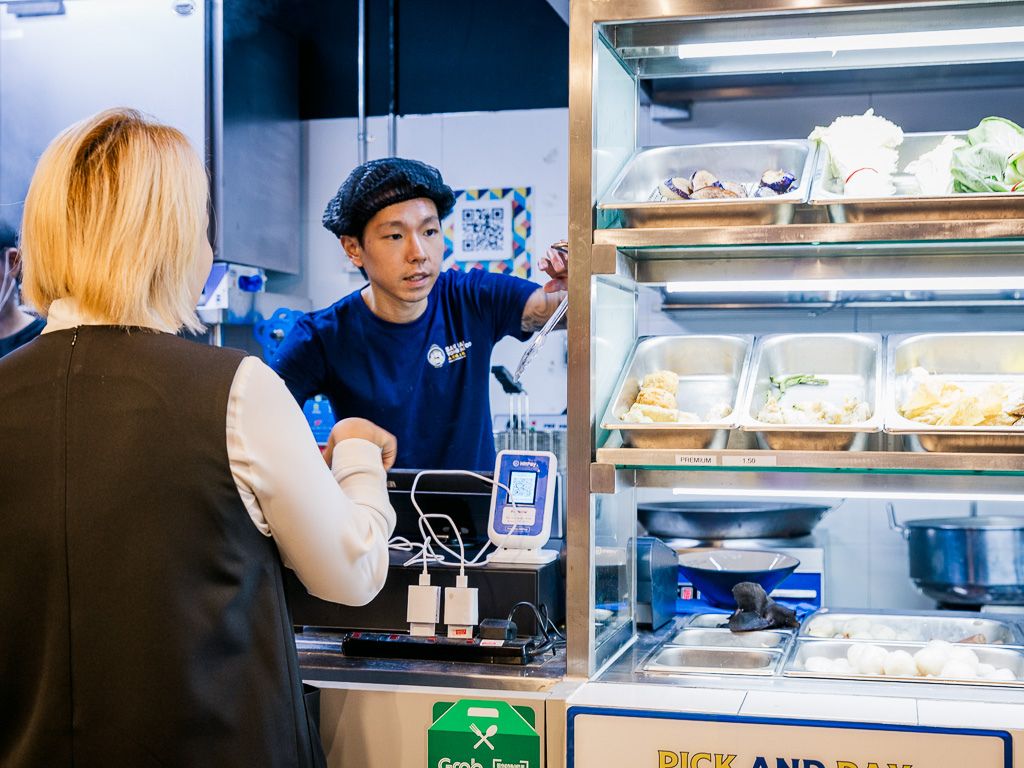
Besides mastering a dying craft, Delonix also sees his role as part of something larger — the continuation of his family’s legacy.
“I think it’s not easy to run a business for over 60 years. I feel that if I’ve got the capability to take care of it, to run it right, that would be the thing I am most proud of,” he says.
He adds: “I can also preserve hawker culture because it’s very sad that it’s slowly dying off. As the older people pass on, no one is going to take over.”
Fishballs and yong tau foo may seem like ordinary, everyday fare for many Singaporeans, but to the Tan family, they represent history, patience, and craftsmanship — values that Delonix refuses to dilute.
Even with modern technology, he insists some traditions cannot be replaced.
“Some things still need to be maintained in small batches,” he says, firmly. “It just hits different compared to when it’s mass-produced.”
SanDai’s alter-ego: SanDai Yong Tau Foo
As if mastering the ropes of fishball making wasn’t enough, Delonix took a leap of faith and recently opened SanDai Yong Tau Foo stall in Serangoon.
But this isn’t his first attempt at branching out. He’d first opened a fishball stall at Amoy Street Food Centre during the Covid-19 pandemic, though the venture was short-lived at that time.
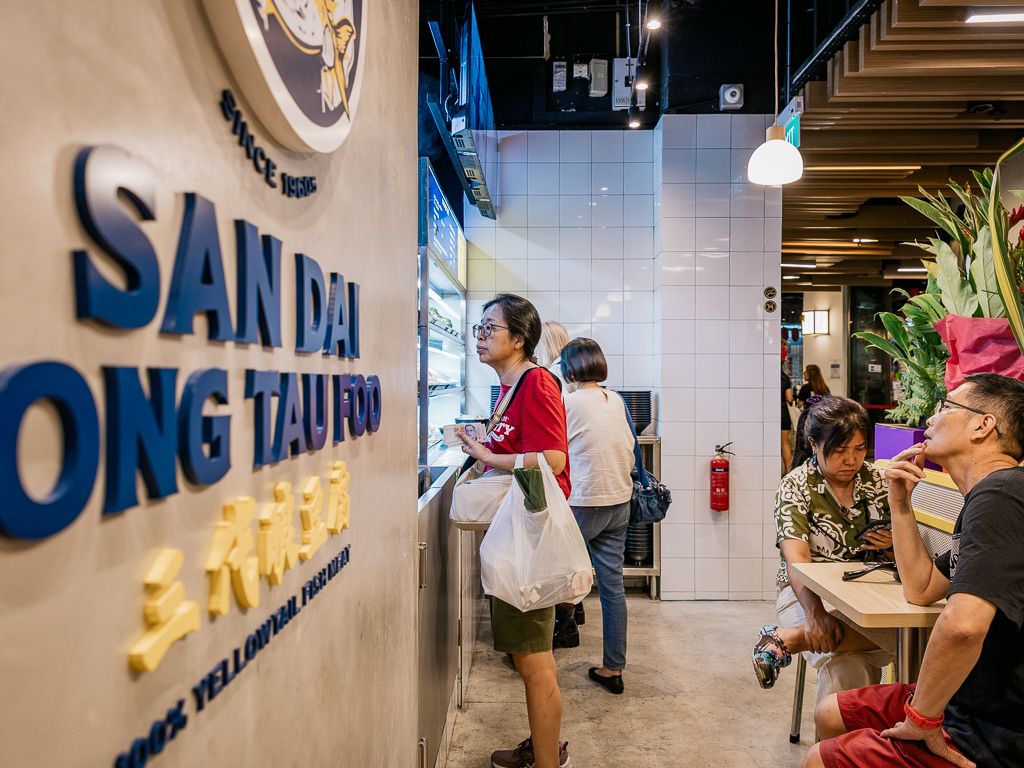
The idea resurfaced after a collaboration between SanDai and Lau Wang Claypot Delights in March this year, where both brands came together for a limited-time collaboration.
Fortunately, the response was encouraging, which prompted Delonix to wonder if he should try again.
“If I want to do it, it should be now, because I have proof that the concept works,” he says.
Leading up to the store’s opening, Delonix spent months training at his uncle’s stall, Xin Mei Cooked Food at Hougang Hainanese Village Centre, where he quickly realised certain skills, such as his mee pok and mee kia cooking techniques, weren’t quite up to scratch.
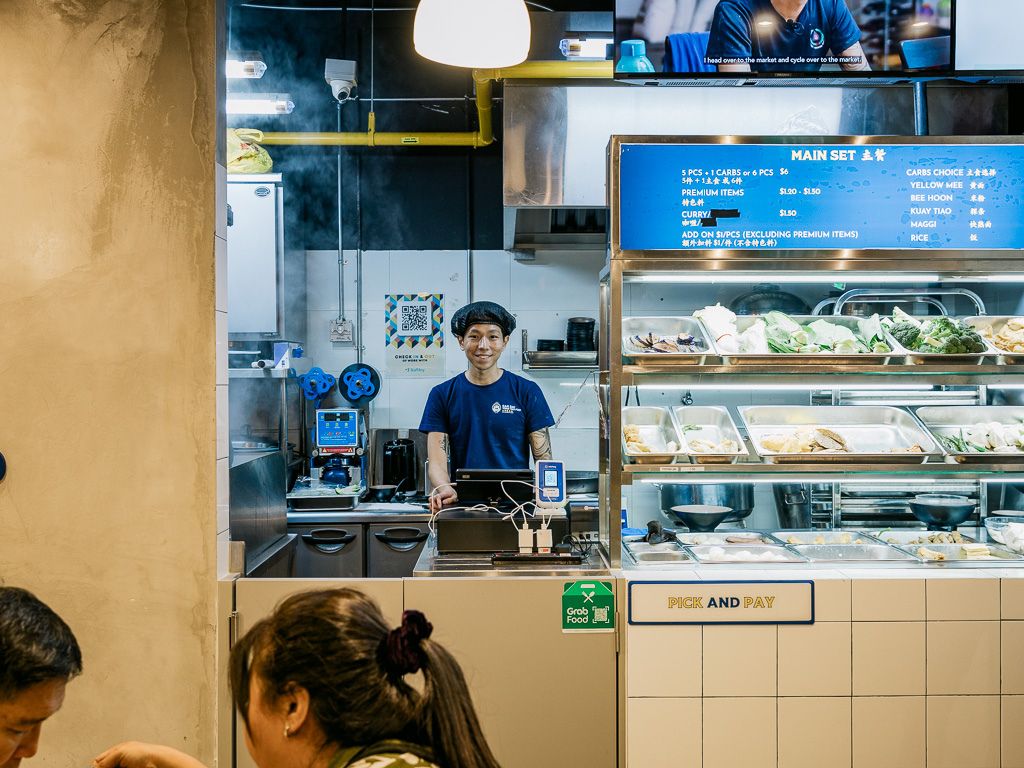
That experience also gave him clarity: To stick to what he does best. With the launch of SanDai Yong Tau Foo, Delonix says, “I want Singaporeans to have the chance to taste what authentic, 100% yellowtail fish yong tau foo is like.”
Even so, the transition into retail has been a whole new playing field. “Everything is very different and on a much bigger scale. It’s a different ball game,” he muses.
Through it all, he’s thankful for his business partner — Mark, the man behind Lau Wang Claypot Delight — whose guidance has helped to ease this shift into a new chapter.
At SanDai Yong Tau Foo, Delonix keeps things simple — allowing the handcrafted goods to take the spotlight.
Freshness is another non-negotiable. Each morning, a new batch from the Toa Payoh stall is delivered here. And whenever the display shelves run low, the onsite kitchen team replenishes the spread — stuffing fresh fish paste into yong tau foo ingredients.
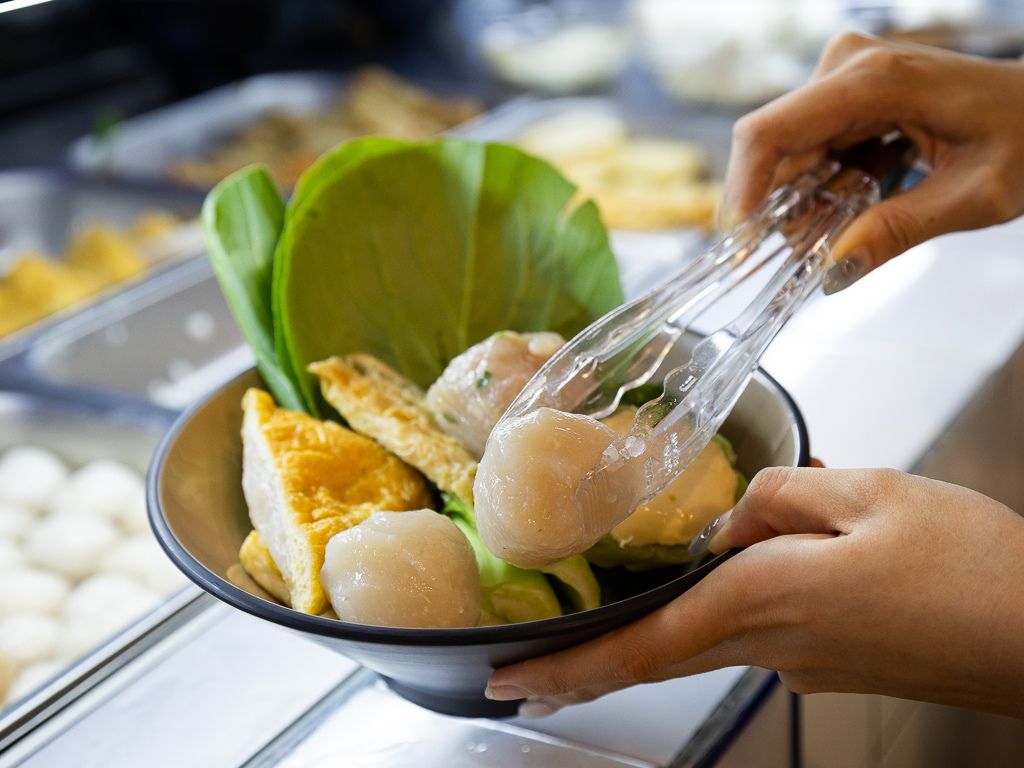
Alongside the usual yong tau foo staples of vegetables, sausages, beancurd skin, and tofu puffs, the stars of the stall are definitely SanDai’s massive, signature fishballs and meatballs — all of which are priced at S$1 each.
A set of five items with a carb of choice — yellow noodles, bee hoon, kuay tiao (kway teow), maggi, or rice — comes up to S$6. Alternatively, you can enjoy six items on their own, sans carb and soup, for the same price.
The menu also features premium, handmade items, priced between S$1.20 and S$1.50. There’s the fried meatball crafted with fish, pork, and turnip chunks. There’re also fried wu xiang spiced rolls, fried beancurd with long beans, and fried wanton with the same pork-and-fish filling.
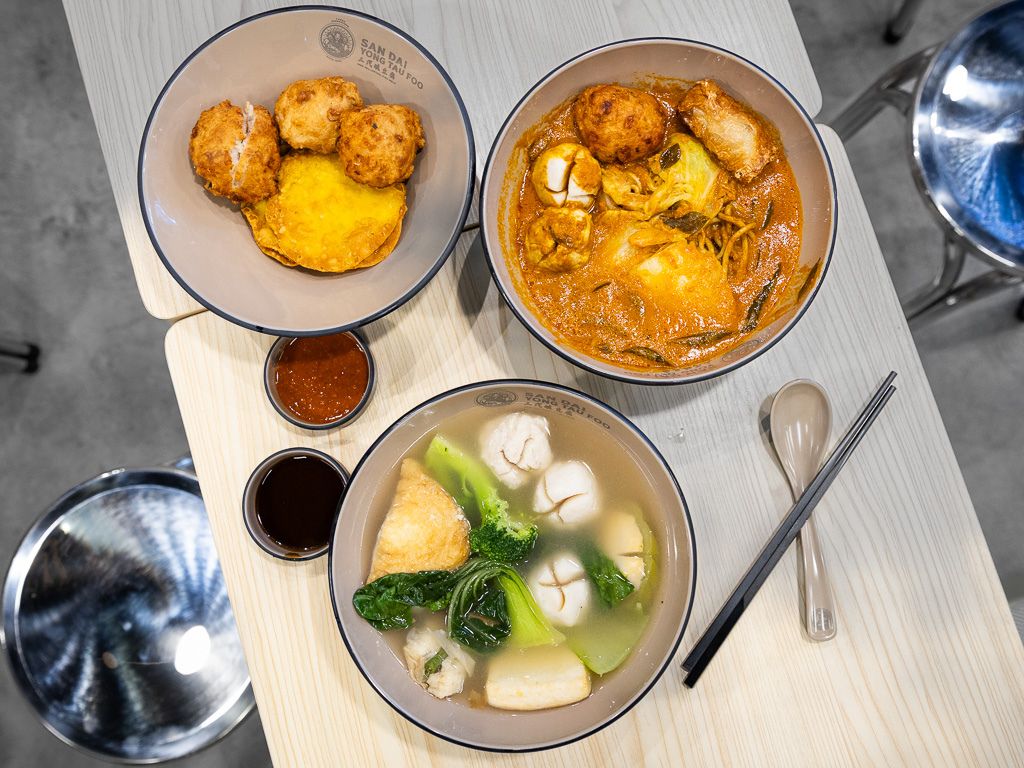
For our first bowl, we went with the classic yong tau foo in a cheng (clear, clean-tasting) soup — a comforting mix of my YTF go-tos: Bittergourd with fish paste, tofu puff, fishcake, fishball, meatball, and some greens.
It’s the kind of bowl that truly warms the soul, especially on a rainy day — hearty, simple, and I had no complaints at all.
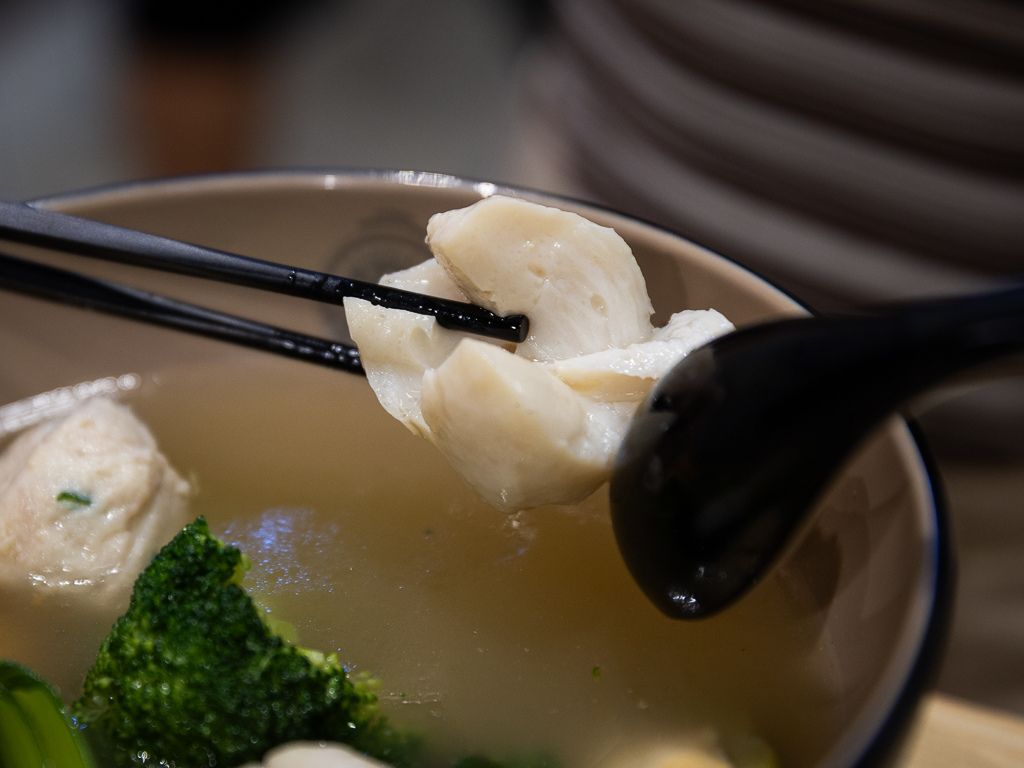
The bitter gourd stood out for its freshness — ripened just right and not overwhelmingly bitter.
Meanwhile, the starring fishball was springy with a deeply satisfying QQ bite. It sets itself apart easily apart from the pastier, machine-made versions you’ll find at most stalls.
The meatball was another highlight, too — tender yet firm, with none of that dreaded rubbery chew.
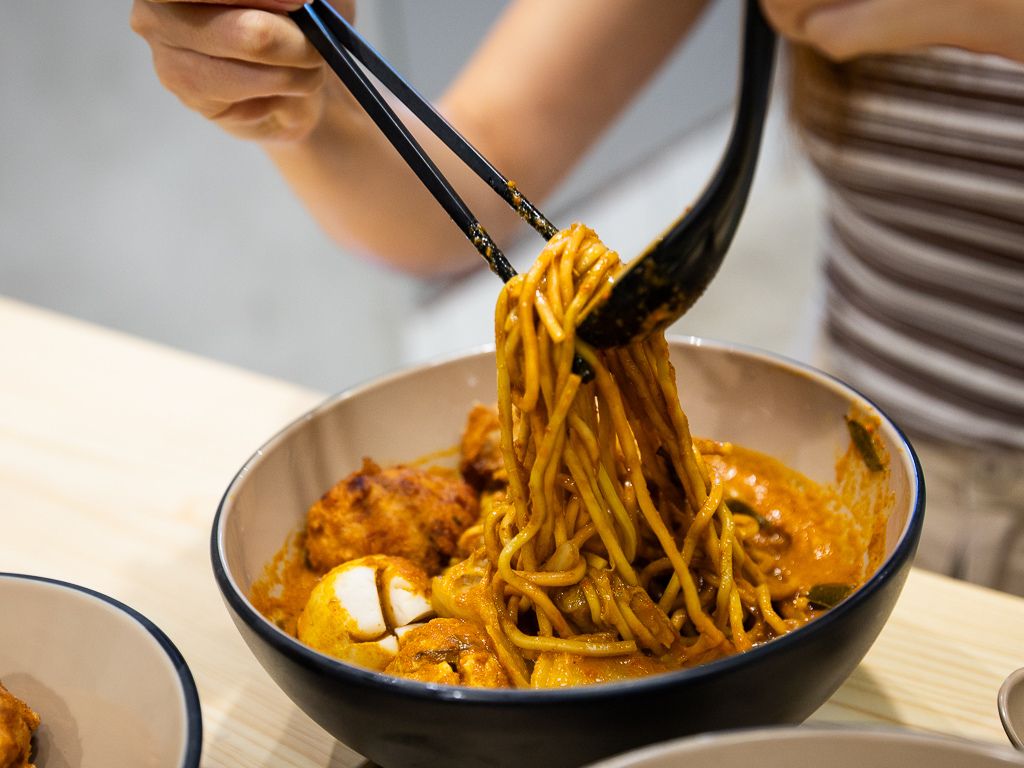
We also tried another bowl with curry (an additional S$1.50) that comes in a rich, dark-orange hue.
SanDai’s version was gao (thick) — more zhup (gravy) than soup — and heralded its arrival at our table with a waft of fragrant spices in the air.
This isn’t a common offering at most yong tau foo stalls, so I wasn’t quite sure what to expect. But I was pleasantly surprised.
The curry offered a mild, punchy kick that reminded me faintly of assam curry. It clung well to the noodles, too, which in turn soaked in all that goodness.
I was also delighted that SanDai’s curry isn’t overly heavy on coconut milk. It’s still comforting and allows the spices to linger on the tongue, gradually building on flavour as we work our way through the bowl.
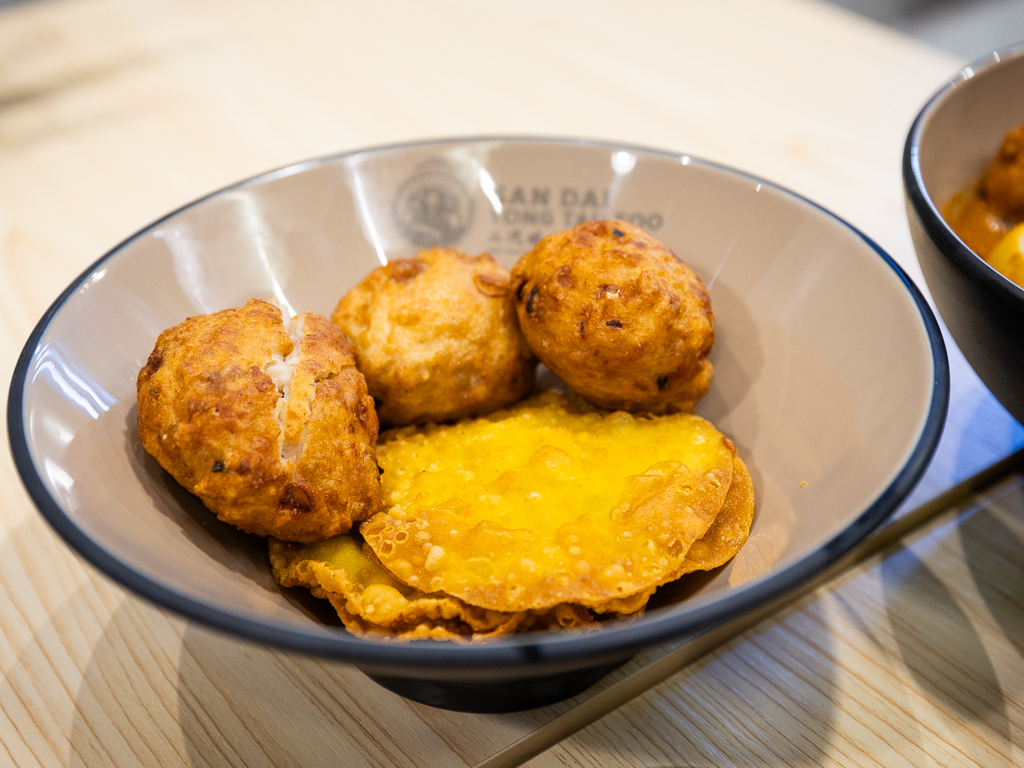
For the ultimate indulgence — or for an even more sinful treat — the golden, crisp fried wanton and fried wu xiang are best dunked into the curry. Trust me on this: It’s very shiok.
And if you loved SanDai’s fishballs and yong tau foo, and want to bring them home, you can also buy the uncooked versions for takeaway. These go for 80 cents each, with a minimum order of 10 pieces.
The future of SanDai
As Singapore moves along with the times, trades that demand long hours and hard labour are quietly fading away. Delonix knows this all too well, which is why he persists in keeping his family’s tradition alive “so there are still some heritage brands around”.
If given the chance to choose again, would Delonix take the same path? Without hesitation, his answer is yes — simply because of how much it means to him to preserve his family’s legacy.
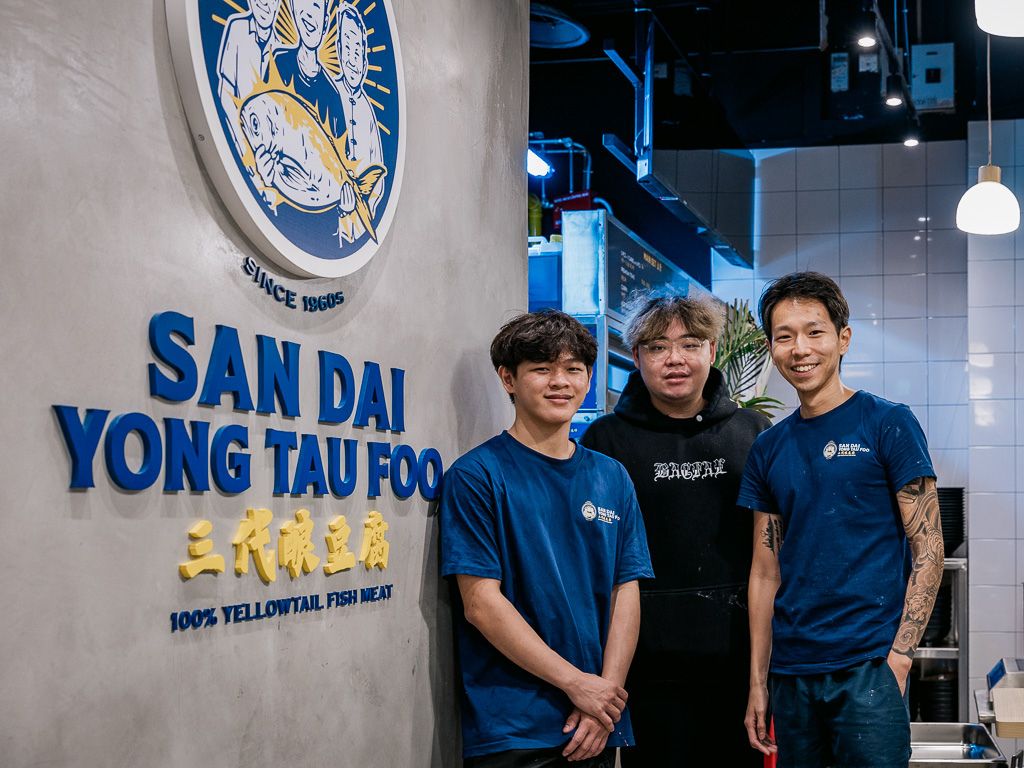
For now, expansion isn’t on the cards. Delonix is focused on getting the fundamentals right. “I want to make sure the customers are happy with our food, happy with our service first, before moving to the next step,” he says.
When we visited SanDai Yong Tau Foo in its first week, the stall seemed to be off to a good start. Nearby residents have warmly welcomed SanDai Yong Tau Foo, with some even calling it a great addition to the neighbourhood.
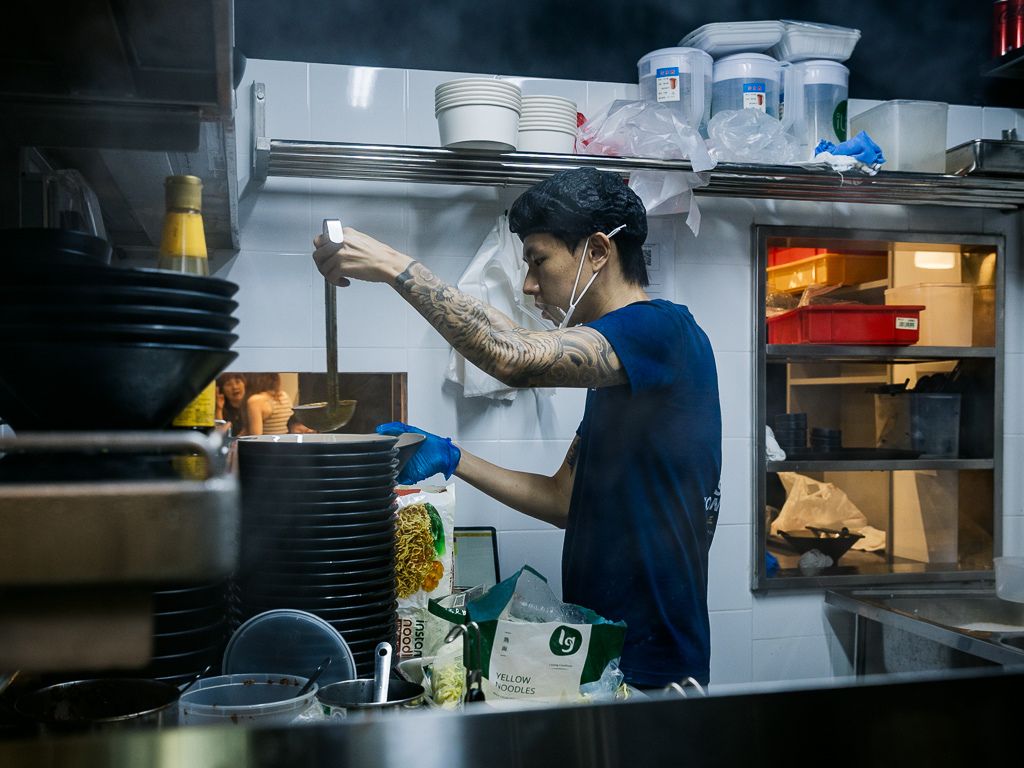
Though the journey has been a rollercoaster, Delonix is thankful for the lessons along the way.
“I realised that the most fulfilling part isn’t whether I manage to open my own shop or I make this amount of money. It’s the person I’ve grown to become and that’s what makes it so exciting. This is what I’ll remind myself of, not the money or the end-product,” he reflects.
If you’re wondering — just like me — whether the brand might one day become SiDai (四代 or four generations), Delonix says: “It’s my dream, but I don’t think I should force it on my children, especially knowing how tough this path is.”
Nonetheless, Delonix is hopeful about keeping the flame alive. So let this be a sign to pop by SanDai Yong Tau Foo, especially if you’re in the Serangoon Garden ’hood!
If you’re looking for more options in Serangoon Garden, check out Chu and Co, an under-the-radar bakery with interesting sourdough bakes. Alternatively, read about our newest, monthly round-up in Singapore.
Wed 10am - 9pm
Thurs 10am - 9pm
Fri 10am - 9pm
Sat 10am - 9pm
Sun 10am - 9pm
- Serangoon
